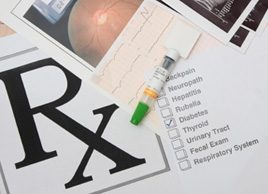Diabetes: Your guide to treatments that work
Here are seven treatments for diabetes that have been proven to help control your blood sugar and increase your response to insulin

Source: Your Health: What Works, What Doesn’t
Diabetes isn’t going away any time soon. Caused by a combination of genetics and lifestyle factors, it’s preventable up to a point, though you might not know it given the increasing number of people with the disease. But treating it once you’re diagnosed is even more challenging, especially as the disease progresses and medications stop working as well. Good blood sugar control is critical to avoiding problems like nerve damage and catastrophes like blindness and amputation. But taking care of your heart is equally key since most people with diabetes eventually die of heart disease’so it’s essential to make sure your blood pressure and cholesterol are under control.
Oral medications
At first, your doctor may have you try to bring down your blood sugar by improving your diet and adding regular exercise, but unfortunately, the percentage of people who can stay off medication is low. There are many different drugs available, and your doctor may use them alone or in combination. It’s agreed that metformin (Glucophage) is the best one to use first. In a review of 29 clinical studies, it reduced the risk of complications like retinopathy and neuropathy as well as death, and it worked better than anything else for controlling blood sugar, cholesterol, blood pressure, and weight.
Because diabetes is a progressive disease, most drugs, including insulin, become less effective the longer you take them. Your doctor may increase your dosage or change your regimen altogether if you aren’t seeing good results.
Insulin
If your insulin-producing cells (located in the pancreas) begin wearing out, you’ll eventually need injections of this hormone. In terms of taking animal vs. human insulin, either is fine, although animal insulin is usually cheaper. An analysis of 45 studies found no significant differences between blood sugar control or episodes of low blood sugar in people taking either purified porcine (pig) insulin or semi-synthetic human insulin, the two forms most often studied, and no differences in negative side effects.
Exercise
It won’t "cure" your diabetes, but it can make your cells more sensitive to insulin, which naturally lowers blood sugar. Fourteen clinical trials comparing people with type 2 diabetes who exercised with those who didn’t found that the exercisers dropped their A1c levels (a long-term measure of blood sugar control) by 0.6 point’a significant amount. People who exercised also became much more sensitive to insulin, reducing the strain on the pancreas, and their triglyceride levels dropped.
If you’re wondering whether you should do aerobic exercise or lift weights, the answer is yes to both. A1c scores dropped an average of 0.51 point after two weeks in people who walked on treadmills or rode bikes and an average of 0.38 point in those who worked out on weight machines. Those who did both got an additional 0.46 point drop.
Since exercise gobbles up blood sugar, if you’re using insulin, you may even be able to substitute an exercise session for an injection. Talk to your doctor.
Weight loss
Drop about 10 percent of your body weight, and your fasting blood sugar level could drop by 26 percent, along with big reductions in cholesterol, blood pressure, and triglycerides. That adds up to a lower risk of heart disease and other diabetes complications. If you’re extremely overweight, consider bariatric surgery, in which a surgeon cinches your stomach into a small pouch so it holds less food. The surgery effectively cured the disease in 73 percent of people with recent-onset diabetes. It’s not to be entered into lightly, however, since it carries significant risks.
Cinnamon
Laboratory studies find that this aromatic spice has insulin-like effects on cells, helping them take up more glucose from the bloodstream. While just a handful of clinical trials have evaluated its use in people with diabetes, most found that supplementing with cinnamon does lower blood sugar levels. One study found that people taking 1 gram a day of cinnamon (about 1/4 teaspoon) had glucose levels averaging 156.5 mg/dl after 40 days, compared to 223.2 mg/dl in those taking a placebo. Stick to 1 gram; two other studies showed similar effects even at higher doses.
Laser surgery for eye complications
Having diabetes puts the eyes at risk; a condition called diabetic retinopathy can even cause blindness. A procedure known as pan-retinal laser photocoagulation, in which a laser is used to make hundreds of tiny cuts or burns in the eye to reduce the growth of abnormal blood vessels, can stem the loss of vision. And if you develop macular edema, or swelling of the retina from leaking blood vessels, focal retinal laser surgery, which aims to close the leaking vessels, is the procedure recommended to preserve your vision.
Antidepressants plus capsaicin cream for nerve pain
There are no medications specifically marketed to treat diabetic neuropathy, which can cause excruciating pain. But based on analysis of 25 studies, reviewers recommended starting with an antidepressant and a cream containing capsaicin, the ingredient in hot peppers that interferes with the nerves’ ability to transmit pain signals. Tricyclic antidepressants such as desipramine (Norpramine), imipramine (Tofranil), and amitriptyline (Elavil) worked much better than newer antidepressants for relieving pain.
What diet strategy is best?
Here’s a sad fact: We don’t really know. That’s the conclusion of reviewers who analyzed 18 studies involving 1,467 participants who followed any of a number of different diets, including low-fat/high-carbohydrate, high-fat/low-carbohydrate, and low-calorie regimens. All that the reviewers could say after evaluating these studies was that exercise works for maintaining blood sugar control and that there is an "urgent need" for studies looking at diet. That said, hardly any doctor or nutritionist would argue against a diet rich in fruits and vegetables, beans, and whole grains and low in saturated fat.




